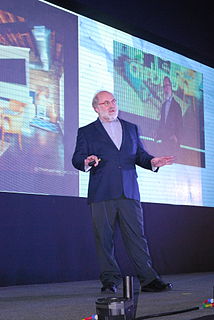A Quote by Noah Hawley
I love the idea that the editing room is the final time you write. You should still be creatively solving problems even at that point. It's not really until you're locked that you can call it quits.
Related Quotes
You know you're ready to write a book when you have a feeling that you should do it, no matter what anybody says. It's like falling in love or starting a company. When you're still wondering if you should get married or you're still wondering whether you should start a company that might be not the right person or the right idea. And writing is the same way. When you've locked on to the topic, you'll just write it.
Solving problems is fine, but it has gotten to the point of being a global obsession. We somehow have it in our heads that if we solve all of the problems, we can sit back and enjoy the easy life. But in reality, we become lazy and complacent. And that's when we get flooded with even bigger problems.
All three parts of filmmaking [writing, shooting, editing] contribute to rhytm. You want the script to be a tight as possible, you want the acting to be as efficient as possible on the set, and you have enough coverage to manipulate the rhythm in the editing room, and then in the editing room you want to find the quickest possible version, even if it's a leisurely paced film. I definitely in filmmaking more and more find writing and directing a means to harvest material for editing. It's all about editing.
I do very, very, very simple, skimpy doodles, nothing too committed. Because people tend to fall in love if they like it - if you color it in and they like it, then they want exactly those colors, even if they were just indications. You really have to do it as simple as possible so they can concentrate on the idea and composition. And then all of the energy goes into making the final piece. And the final piece can be anything - it can be a drawing, a painting, a collage - and usually, it's obvious what that should be. Usually, the idea dictates what medium you use.
I watched a lot of movies from all over the world. The Russians were very good at editing. They were specialists in editing. The Man with a Camera, if you know that movie, is incredible. I still don't understand how it works. It's a movie with no script, no actors and still it works. It's really good. It's really about editing.
Using film was so much easier than the digital technology of today. But digital is still at the beginning of what it can be and they'll be fixing all those problems. It's just too complicated - negatives, tinting, flashing - it's a whole new system that takes a lot of time. Of course, it's not as physical. Even the editing. You used to feed a piece of celluloid into an editor. [Digital] is not expensive and that is an advantage, but I must say that I don't love it.



































